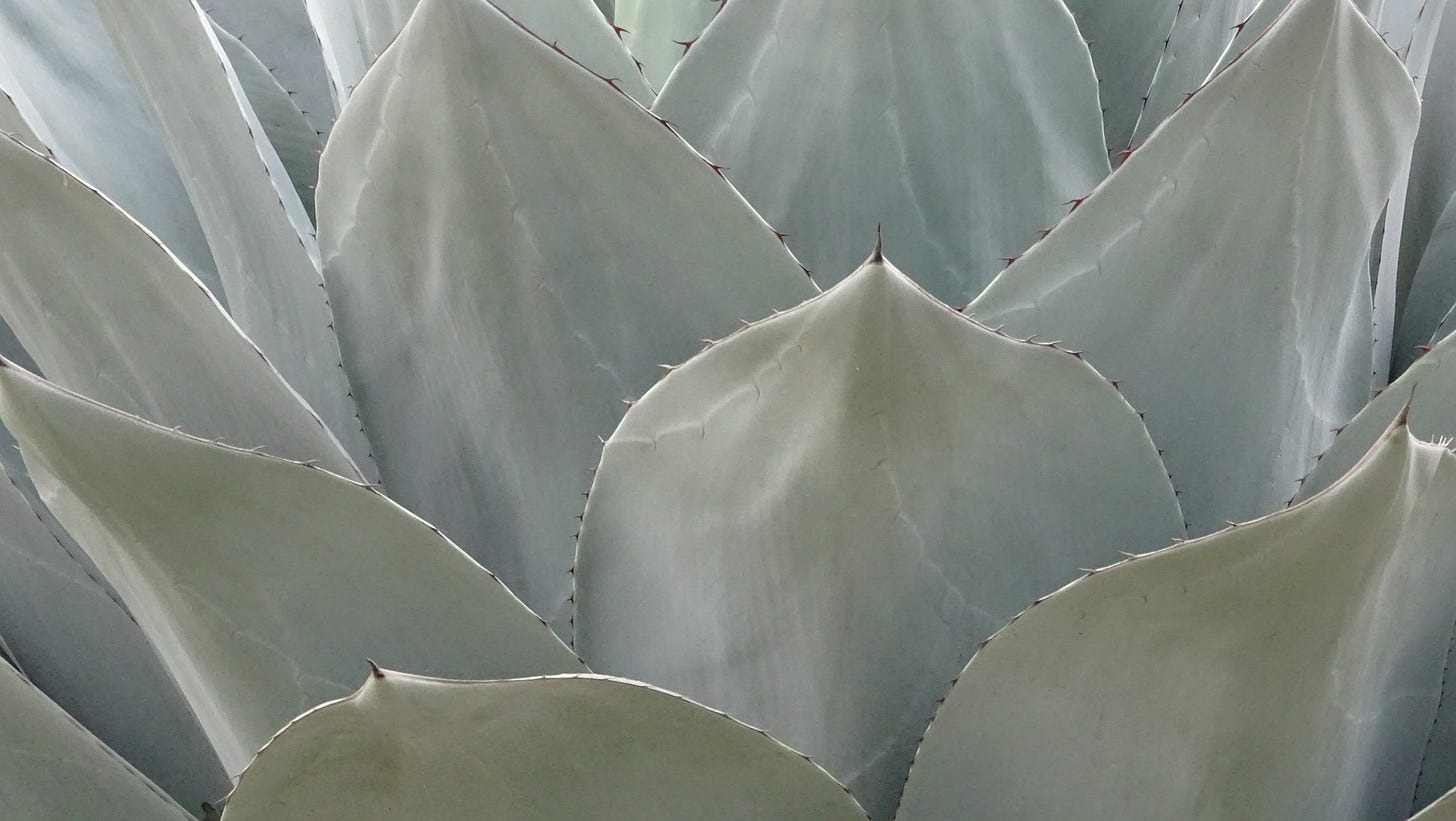Is Mezcal Really Healthy for You?
Yes; it enhances IQ and penile rigidity! I'm kidding. Read the article...
Articles like this one have been making the rounds for quite a few years now, but some of them are simplistic and incomplete. Others feature headlines that could be considered pretty misleading. I’ve done my best to bring everything together, the good and the bad, in order to arrive at an informed conclusion on this.
It seems to me there are three broad categories of consideration…
The sugars present in mezcal
Terpenes present in mezcal
Congeners and other compounds present in mezcal
So, although I’m nothing close to a doctor or scientist, I will plow forward with all possibly misplaced confidence that perhaps I won’t miss anything too important and embarrass the hell out of myself.
Sugars in Mezcal
Distilling mezcal (or any other spirit) first requires fermentation. And fermentation requires the presence of sugars. Depending on the spirit being made, those sugars can come from grains like barley, corn, oats, rye, wheat or rice, or from fruits or vegetables like apples, grapes or potatoes. They can even be raw sugars from cane, molasses or honey. Then distillation basically just concentrates the liquid to increase its alcohol by volume.
Isn’t it true that the type of sugars used to make a spirit translate into meaningful differences?
Well, the sugar that comes from agaves is called agavin. It’s a natural type of fructose called a fructan. The thing that makes it different from other fermentables is that it’s sugar molecules are linked by long chains. As such, they are a non-digestible dietary fiber that won’t raise blood sugar levels—but still have a sweet flavor and are still fermentable.
In one study published in the journal Food & Function, scientists added agavin to the water of mice. It resulted in the mice having higher levels of the hormone GLP-1, which slows digestion, helping them feel fuller so they ate less, lost weight and had lower blood sugar levels—as opposed to mice given other sugars or aspartame. No human trials have been conducted as of yet, but if these results track with people, there’s one pretty decent discovery: an agavin based sweetener may border on revolutionary.
But we need to hold our horses: while I’ve found a number of articles hinting that this is a great advantage for mezcal, I think that may be misleading. While those agavins are great, they are all converted mostly to ethanol during the fermentation process. So I find no support for this claim whatsoever.
The good news? For those wishing to keep their carbs low, mezcal has zero carbs per shot. But so do all the other straight spirits too!
The Point: advantageous agavins are not present by the time agave becomes mezcal. But mezcal is zero carb anyway! So like other spirits, mezcal is a good alcohol choice for those wishing to keep their carbs low—as long as you’re not adding sugary mixers to it. That’s a deal breaker.
But there are other elements worth considering.
Terpenes in Mezcal
Terpenes are compounds that give plants their own signature scent, but are also believed to carry health benefits. There are at least six terpenes found in mezcal worthy of consideration regarding health. I’ll run them down, then sum them up.
Linonene is a terpene found in one study to have anti-tumor effects. In another study, researchers found many terpenes in common among various spirits, but limonene was only present in mezcal.
Geraniol is a terpene found in one study to have anti-depressant effects on mice that were experiencing stress. The conclusion is that it may have mild therapeutic effect for those struggling with stress or depression. It’s also found in mezcal.
Citronellol is a terpene found in mezcal. One study found that in mice this substance relaxed the muscles that line blood vessels, acting as a vasodilator, which decreases blood pressure. Of course drinking a lot of alcohol has been found to increase blood pressure. So there’s presently no way of knowing whether this terpene has any counteracting effects.
Anecdotally, my local friend Tony Ronci, who monitors his blood pressure regularly, says, after 5 years of drinking mezcal with me on Friday evenings, he notices upon returning home his blood pressure is always lower than usual.
Eugenol is also found in mezcal. This one, according to a research paper, has anti-oxidant properties, binding to free radicals and preventing oxidative stress.
Farnesol is the final terpene found in mezcal that we’ll mention. According to this paper it possesses anti-inflammatory properties. Again however, heavy alcohol use is known to increase inflammation. So whether it helps or not, we don’t know.
The more you look into terpenes the more you realize they’re nothing to sneeze at. Within the world of cannabis alone you’ll find varying terpenes that produce very different and very powerful effects. But, as referenced above, there’s no specific evidence that the above mentioned terpenes, in the presence of alcohol, are substantively accomplishing anything healthful. But…they may be.
However I’m guessing that the very special buzz we mezcal maniacs get may well be the result of these or other terpenes found within the agave. Why does mezcal make many of us feel more exuberant than other alcohol? I hope to understand more on this in the future.
Other Compounds in Mezcal
Oxalates are compounds found in nuts, seeds and plants that create crystals by binding calcium to other minerals. This study indicates that mezcal and all other Mexican agave distillates contain oxalates. While there’s no evidence of it, it could be that this increases the likelihood of experiencing kidney stones.
Then there are congeners, chemical components that arise during the fermentation process. Methanol is one congener, and I think my previous article does a decent job of explaining that it is only when evil MFers surreptitiously dump it into a spirit that it’s a problem—and not because of the tiny amount found in any properly distilled product. But there are other congeners: fusel alcohols, acetone, acetaldehyde, esters, tannins, and aldehydes.
As I understand it, all congeners are technically impurities and not what one would consider healthy. BUT…many of them produce characteristics that people love, greatly contributing to the complexity, smell and flavor of mezcal. This combined with the reality that, in very small amounts, the drawbacks are quite minimal, I’d say most of us Mezcal Maniacs accept and even celebrate their presence in a magnificent expression.
But it’s also true that the more congeners present, the more potential for those drawbacks; as in headaches and feeling like crap the next day. From what I’m finding, it appears that one reason some spirits have fewer congeners than others is because of how “refined” they are; think several distillations. I’d say most of us prefer our mezcal distilled twice. With some exceptions, the more it’s distilled, the more all that complex beauty is minimized.
So a seven-times-distilled vodka should have less congeners than a twice-distilled mezcal. But still, white spirits are known to have far fewer congeners than do brown ones. There is one study in which participants drank either Wild Turkey Bourbon or Absolut Vodka, and the bourbon group “reported more severe hangovers than the people who drank vodka.”
”According to the study, bourbon, which is aged in oak barrels, has 37 times as many congeners as vodka.” Thirty-seven times?!
Another congener is ethyl carbamate, which is a compound “reasonably anticipated to be a human carcinogen,” according to this study. But yet another found that, in mezcal, it wasn’t in high enough concentrations to be considered problematic—and was below international safety guidelines.
Final Analysis
So how do we process it all? If you’ve been reading this article hoping to hear mezcal can actually be considered “healthy,” I’m sorry to disappoint. But I’m guessing you already understand that, while there can be some moderately positive aspects of drinking mezcal over other spirits, we’re still talking about booze here.
I’ve actually been working on this article for two months, and in that time have emailed 4 doctors who have been quoted in a few articles, explaining that mezcal offers ‘the lowest sugar and calories’ or the agavins from agaves ‘help lower blood sugar.’ Neither of the 4 have replied. I wouldn’t shame them for that; maybe they’re just too busy, or some of those emails weren’t noticed or were processed as spam. If I ever do get an informed reply on this, I’ll revisit the subject.
But, try as I might, I find no support for the claim that mezcal has lower calories or sugars. Check into this yourself: I think you’ll find that straight liquors are all pretty close in calorie counts. The only time there seems to be a difference is when some feature a higher ABV, and the higher the alcohol percentage the higher the calories. What do we know about mezcal? Most of the good, artesanal stuff IS higher in ABV; so it’s probably a little higher in calories compared to 35-40% ABV spirits. Sugars? Well if it’s a spirit and there’ve been no additives, there shouldn’t be any sugars left, right? Sugars are what are converted (mostly) into alcohol.
As to the type of sugars, yes, mezcal is distilled from a plant full of agavins, and they don’t produce the spike in blood sugar others do. Great. Super. It sounds like an agavin based sugar substitute may be a magnificent discovery. But, again, if it’s true that all sugars convert to alcohol through distillation, no agavins remain to provide a potential health benefit. Is there a reason to believe some positive aspect of agavins—beyond the sugar itself—somehow makes it into the spirit? In my own research I find no one specifically suggesting this. What about the aforementioned mouse study? Well they were given agavin—not a spirit derived from it.
Then why do at least some of us find the effect that comes from mezcal so distinctively pleasant? For me it’s an especially buoyant buzz, and you’ll have to trust me: I’ve drunk MANY different alcoholic beverages. Often to excess. In the absence of any other data, I’m left to conclude that these are the reasons why agave distillates are more exhilarating and less problematic for those who drink them…
1) It may be because of the terpenes or other compounds naturally occurring in agave plants. Perhaps the compounds common to agaves have a somewhat more positive effect on human health—and those common to other raw materials don’t.
2) Maybe the fact that congeners (impurities) stemming from agave fermentation are less abundant than in many other drinks means fewer things are sabotaging the pleasurable aspects of one’s drinking experience—during and after.
Maybe one day some biochemist will have the answer as to whether (or why) artesanal mezcal is healthier than other spirits. And I don’t know about you, but I won’t be waiting for the scientific establishment to inform me of what I already know in that regard.
As usual, if you’re coming to San Miguel de Allende, let me know, and let’s drink mezcal!





